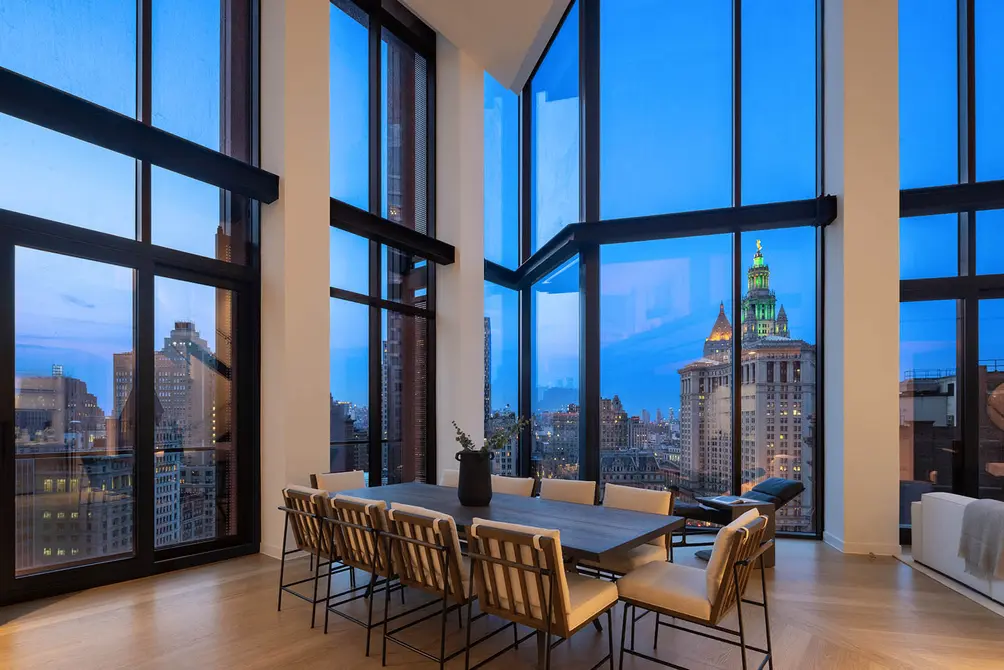 No. 33 Park Row, #PH3 (Evan Joseph)
No. 33 Park Row, #PH3 (Evan Joseph)
Between April and June 2023, approximately 65 percent of real estate deals in Manhattan were completed without financing. As reported in Bloomberg in early July 2023, this represents the largest share of all-cash deals recorded since appraiser Miller Samuel Inc. and Douglas Elliman Real Estate started tracking payment methods nearly a decade ago. A few weeks later, Manhattan's top contract was for a penthouse in a cooperative that does not allow mortgage financing. This article examines how the current surge in all-cash may impact local buyers, renters, and the city itself.
Factors driving all-cash deals
There are several reasons for the current increase in all-cash deals. First and most significantly, high mortgage rates continue to make financing home purchases an unattractive option for a growing number of buyers. But there are also two other factors currently fueling the surge in all-cash deals, particularly in Manhattan. These factors include the return of foreign buyers and the current strength of Manhattan’s super-prime and ultra-prime markets. Notably, both foreign buyers and high-net-worth individuals are far more likely than other buyers to purchase properties without financing.
Why sellers and boards welcome all-cash deals
Both individual sellers and condo and coop boards often prefer all-cash deals but for slightly different reasons. From a seller standpoint, an all-cash deal is typically viewed as attractive because it nearly always speeds up the process of closing. Indeed, skipping the mortgage application and underwriting process can shave weeks and even months off a closing. For condo and coop boards, all-cash deals are also frequently preferred since buyers who don’t require financing are generally viewed as lower risk.

The impact on buyers and sellers
A real estate market driven by all-cash deals is certainly good news for people who are in the position to invest without financing. But depending on how long this trend persists, it could end up impacting all buyers and sellers.
Buyers relying on financing will face increased competition
While many all-cash deals are happening on the luxury condo market, resale coops and condos across the price spectrum are also being purchased in all-cash deals. In the short-term, this seems likely to continue creating additional obstacles for buyers in need of financing, and especially first-time buyers who are even more likely to require high levels of financing. A recent National Association of Realtors survey found that first-time buyers currently account for the smallest market share in 41 years.
Coop and condo boards may alter financing rules
While it is unclear if we’re already seeing a response to the recent surge in all-cash deals, a growing number of Manhattan condos and coops now require between 25 and 35 percent down versus a mere 20 percent down. Depending on how long the current all-cash trend continues, it is possible that more condo and coop boards will alter their financing rules.
The dominant demographic of buyer will likely continue
Unsurprisingly, in a market dominated by all-cash buyers, people who already own one or more properties are more likely to be in the position to buy. In addition to negatively impacting the number of first-time buyers, over time, this may also lead to an increasingly homogenous buyer demographic and further widen the racial and ethnic gap in home ownership.
The impact on renters
In 2022, the availability of rentals in New York City hit an all-time low as rental prices reached new all-time highs. Since early 2023, rental prices have remained high but the surplus of rentals has increased. One factor that may be contributing to the growing surplus of rentals is the number of units being purchased by investors. That said, there is no guarantee that the current surge in investor-driven all-cash deals will substantially improve the rental market over time since investors often choose to neither inhabit nor rent out their units. This also leads to a final and by no means minor concern.The impact on the city
The current spike in all-cash deals also brings another risk—the spread of ghost communities, particularly in Manhattan. Some neighborhoods, including a large swath of Midtown East running from 49th Street up to 70th Street between Fifth and Park Avenues, has long been home to absentee owners, with data suggesting that at least one third of the area’s units are unoccupied most of the year. With all-cash deals increasingly driving the local housing market, there are renewed concerns that the percentage of unoccupied units will increase, which could further hamper efforts to revitalize the Manhattan neighborhoods hit hardest by the pandemic, including Midtown East.

Contributing Writer
Cait Etherington
Cait Etherington has over twenty years of experience working as a journalist and communications consultant. Her articles and reviews have been published in newspapers and magazines across the United States and internationally. An experienced financial writer, Cait is committed to exposing the human side of stories about contemporary business, banking and workplace relations. She also enjoys writing about trends, lifestyles and real estate in New York City where she lives with her family in a cozy apartment on the twentieth floor of a Manhattan high rise.

 6sqft delivers the latest on real estate, architecture, and design, straight from New York City.
6sqft delivers the latest on real estate, architecture, and design, straight from New York City.
